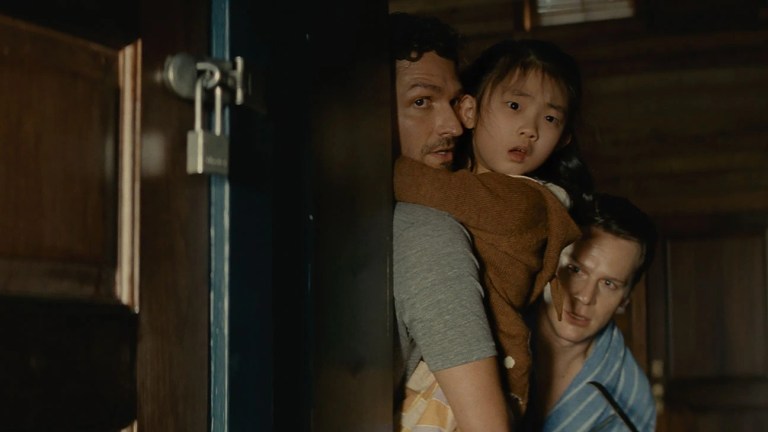Knock at the Cabin Ending Explained: How to Change the Book But Keep the Spirit
M. Night Shyamalan’s Knock at the Cabin adapts Paul Tremblay’s The Cabin at the End of the World. It’s different but still faithful.

Contains spoilers for Knock at the Cabin and The Cabin at the End of the World.
Knock at the Cabin is about love. It’s a home invasion horror, an apocalyptic disaster movie, a virtually single location character piece, but mostly it’s about love. Paul Tremblay’s The Cabin at the End of the World is also a book about love, though in some ways it’s a rather bleaker prospect when it comes to the end, depending on how you see it.
The film sees family Eric (Jonathan Groff), Andrew (Ben Aldridge) and their 8-year-old daughter Wen (Kristen Cui) on vacation in a remote cabin when they are visited by four strangers who come with a terrible prophesy – the world will end unless the family makes the active decision to sacrifice one of the three of them. They must choose and they must kill that person.
When they understandably refuse, one of the four – Rupert Grint’s Redmond, puts on a white mask and submits to his own gruesome murder. Each of the remaining three – Abby Quinn’s Adriane, Nikki Amuka-Bird’s Sabrina and Dave Bautista’s Leonard – will follow suit on subsequent days until the family makes their choice. Every time they refuse to do so, more global disasters will occur from tsunamis and plagues, to planes falling from the sky.
What would you do?
The answer to that question may differ depending on whether you’re reading the book or watching the film. Here’s how the two diverge and here’s what that means.
Is the family really responsible for the apocalypse?
In the film, yes, in the book, unclear.
The book and film stay fairly consistent in the first half – the family are very dubious that they have anything to do with it. The footage the four strangers (the four horsemen of the apocalypse, essentially) initially show on the TV of the disasters is pre-recorded and so it’s plausible they are using this prior knowledge to recruit the family into a cult or similar.
But towards the end of the film it becomes apparent that the apocalypse is real, and the family did indeed have the weight of the world on their shoulders. They discover this after Eric is convinced by the horsemen (he sees a vision in a shaft of light) and persuades Andrew that he must sacrifice himself. He does this for his daughter, so that she will have a chance to grow up and experience the world and he does it out of great love for Andrew. We also understand that Eric has faith and has made his peace with the decision.
Is it a happy ending?
In a sense yes – this is a film about love and Eric’s great love for his family has not only saved them but the world.
Though Andrew and Wen have suffered a terrible loss, there’s an implication that the two will ultimately be ok. In the car after Eric’s sacrifice “Boogie Shoes” by KC & the Sunshine Band comes on – the song they had danced along to as a happy family before their ordeal. Andrew turns it off, but Wen switches the song back on again. They are devastated, yes, but they will live and love each other and Eric will not be forgotten. Later we see grown up Wen and Andrew. Wen is now driving the car. A metaphor for her now being in the driving seat, perhaps?
On the other hand, it’s not a happy ending at all, because presumably hundreds of thousands of people have already died in the three days prior and all the decision making stuff was essentially futile. It also means the family have had to bend to the will of a cruel and vengeful god, which doesn’t sit comfortably either…
It becomes less a film about ‘what decision you would make?’, and more a question of what it would require for you to believe that you actually are responsible for the apocalypse.
While it’s different from the book, the original ending was never going to make it to the big screen and especially not in an M Night Shyamalan movie – he’s a director who favors a twist over a lingering ambiguity.
How does the book end?
Brace yourself. Wen dies. And not as a sacrifice but accidentally, shot by Andrew who has gone to fetch his weapon in the hope of it helping them make their escape. Yeah.
Like in the film, Eric is on the fence about the apocalypse, having had some sort of vision. And like in the film, Andrew isn’t convinced. But the absolute tragic beauty of the end of Cabin at the End of the World, is that for these two it no longer matters if there is really an apocalypse. Wen is dead, so for them the “apocalypse” has already happened. And worse still, within the rules of the horsemen it doesn’t even count as a sacrifice because it wasn’t something the family had chosen.
Wen is dead and all the horsemen but Sabrina have sacrificed themselves. Sabrina takes Andrew and Eric, carrying Wen’s corpse, to where their van keys have been buried, with vague info about where the van is left (the gang have moved it to prevent them leaving). She implores the men one last time to choose and sacrifice one of them before it is too late. And she takes her own life leaving Eric and Andrew despairing and alone.
Both are willing to die by this point. Not because they want to play by the rules – any god that would not accept the death of their precious daughter as enough of a sacrifice is not a god they care for. But because their world has all but ended already. Ended – but for each other and the profound love they share.
Because of that love neither can sacrifice himself: seeing the other die and being left alone is a far worse fate than death. They must both live, for the sake of one another. Like Samuel Beckett’s famous quote from the end of his novel The Unnameable goes, “You must go on. I can’t go on. I’ll go on”. It’s the mantra of the book by the end (and the human condition, and of love itself – it’s a weighty book). Andrew and Eric will continue, together, alone in the face of an actual apocalypse, or just their own personal one. This wasn’t their choice, it wasn’t their fault, and they’ll be damned if they destroy each other for the sake of a vengeful deity that may or may not exist. Fuck that guy, as they say at the end the book (we are paraphrasing).
The word, as the start of the new testament proclaims, is love. And at the end of Cabin, love is what remains – god, apocalypse or not.
Why the change?
Well, we’re not surprised that Night opted not to kill an 8-year-old and have an ending which would leave audiences sobbing into their popcorn at best, and annoyed because there’s no definitive answer about the apocalypse at worst.
At a post-screening Q&A Shyamalan told audiences about discussions he had with his own family – he has three daughters – about what they might do in this situaton. At the start, he said, the family opted to sacrifice no one. But at the thought that the youngest would never find love, never get married, never go to university or experience life, the family all decided it was worth the sacrifice. And that is the route the film takes – Eric willingly dies so that Wen and Andrew can live. And that’s a decision made with love too. Keeping Wen alive allows an ending where no ambiguity is left but the themes of the story are the same – or similar at least.
The book may be more grown up, more devastating, more nuanced and perhaps more satisfying but the film makes smart choices to cater for a different audience, and both sit well side by side resulting in one of Shyamalan’s best movies for a while.
Knock At The Cabin is in cinemas now.
